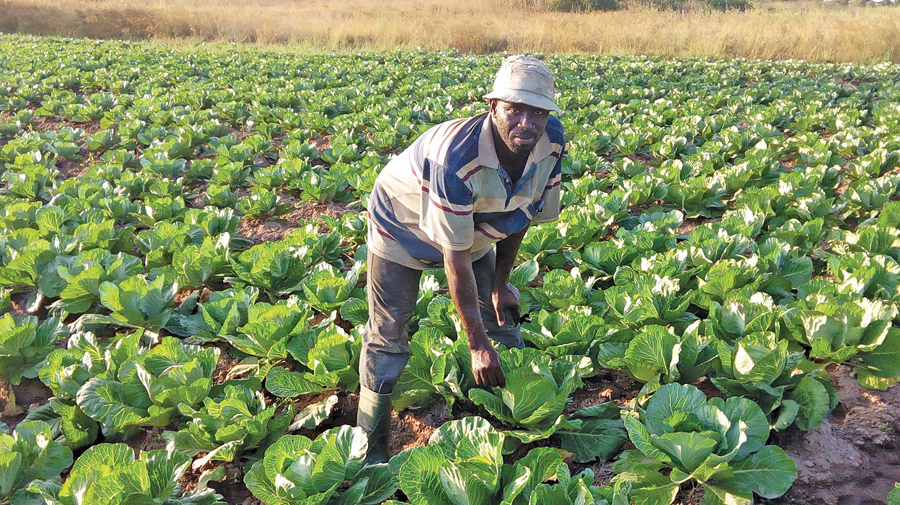
INPUT AND FARMER’S PROFITABILITY
Nigeria is a country with vast agricultural potential, a nd the farming sector plays a significant role in the country’s economy by contributing to its GDP and providing employment opportunities for a large portion of its population. However, despite this potential, many Nigerian farmers face a number of challenges that hinder their profitability.

Image credit: www.freepik.com
One of the primary challenges facing Nigerian farmers is the limited access to quality inputs, such as high-quality seeds, fertilizers, herbicide, and pesticides. Smallholder farmers in Nigeria, who make up the majority of the country’s farming population, are particularly affected
by this challenge. According to a study by the International Food Policy Research Institute (IFPRI), smallholder farmers in Nigeria spend up to 60% of their income on purchasing inputs, and most of these inputs are of poor quality. This leads to low productivity, low crop yields, and reduced profitability for farmers.
Another major challenge is the lack of access to markets and price information. Many Nigerian farmers are unable to get fair prices for their crops due to the limited information they have about market conditions and their lack of bargaining power. This means they are forced to sell their produce at low prices, which limits their ability to earn a fair income and invest in their farms.

Image credit: www.freepik.com
Over time, the shortage of inputs has had a direct impact on farmers’ profitability. Without access to the necessary inputs, farmers are unable to grow quality crops to sell in the market. Adequate and appropriate inputs are essential for farmers to reach the right consumers, ultimately leading to higher profitability. However, farmers often face multiple obstacles to accessing inputs, including the following reasons;

Image credit: www.freepik.com
• Inadequate infrastructure: Nigeria has limited infrastructure, particularly in rural areas where most farmers operate. Poor transportation networks and inadequate storage facilities contribute to high input costs, as it can be difficult and expensive to transport inputs to remote areas.
• Currency fluctuations: The Nigerian currency, the Naira, has been subject to significant fluctuations in recent years, which can impact the cost of imported inputs. Many
agricultural inputs, such as fertilizers and pesticides, are imported, and their prices can be affected by changes in the exchange rate.
• Limited access to credit: Many smallholder farmers in Nigeria has limited access to credit, which can make it difficult for them to invest in inputs. Without access to credit, farmers may be forced to purchase inputs at retail prices, which are often higher than wholesale prices.
• High transportation costs: Transportation costs can be a significant contributor to the high cost of inputs in Nigeria. Many inputs are transported long distances, and transportation costs can be passed on to farmers in the form of higher prices.

Image credit: www.freepik.com
• Market distortions: Nigeria’s agricultural markets are often inefficient, with a lack of price transparency and limited competition. This can lead to higher input costs for
farmers, as suppliers may have greater bargaining power.
Despite these challenges, there are initiatives underway to address these issues and improve input access and farmer profitability in Nigeria. The Nigerian government has also launched several programs aimed at increasing access to quality inputs and improving market conditions for farmers. In addition, private sector organizations such as agro-dealers and processors are working to improve the availability and quality of inputs and providing market linkages to farmers. Improving input access and market conditions for Nigerian farmers is crucial for the growth of the agricultural sector in the country. By addressing these challenges, farmers will be able to increase their productivity, earn a fair income, and invest in their farms. This, in turn, will contribute to the development of the Nigerian economy, reduce poverty and improve the
standard of living for the country’s farming communities.
SOLUTIONS TO LACK OF INPUT
• Infrastructure development: Enhancing infrastructure, such as roads, power, storage facilities, and markets, can help to increase the availability of inputs in rural areas
thereby reducing transportation costs.
• Local input production: Encouraging and supporting local input production is critical to increasing the availability of affordable and appropriate inputs, particularly for
smallholder farmers in rural areas. The national seed agency should strongly consider providing seed company registration free of charge, offering awards, and extending
financial assistance to local seed producers.
• Accessibility to credit: improving farmers’ access to affordable credit is crucial to enhancing their ability to invest in inputs and improve productivity and profitability.
The government must prioritize access to credit and inputs and cease the use of agricultural products as campaign materials.
• Investing in research and development: Investing in research and development is essential to improving the quality and effectiveness of inputs and making them more
suitable for local conditions. Government and private startups must take an active role in the research and development of specific seed productions, such as maize, okra, and vegetables. In addition, locally produced seeds in Nigeria should be well-packaged, branded, and publicized for other African countries, while their producers should be recognized by the seed association for encouragement
• Promoting extension services: Providing farmers with access to extension services, such as training and advice, is critical to improving their knowledge and skills related
to input use and management. The absence of such services is unacceptable, as it leaves farmers without critical information necessary for their success. How can we expect a farmer who wants to produce maize in 2023 to succeed without information from the state or federal ministry of agriculture on the approved agrochemicals, input types,
specific prices for these inputs, and assigned extension agents in their farm community?
Furthermore, we must question the status of agriculture extension graduates. Where are they working, and why are they not posted in these areas to provide critical information to farmers? It is time for extension agents to take up their course and contribute to improving farmers’ profitability. We cannot afford to neglect this important aspect of agricultural development any longer.
STARTUPS CREATING ACCESS TO INPUT

Image credit: www.freepik.com
AFRIMASH: Afrimash is Nigeria’s leading eCommerce marketplace for agricultural items where you can shop conveniently and securely for quality items and receive your order safely at your location.
FARMSQUARE: Farmsqaure supply and deliver organic produce/products, conventional fresh farm produce, processed agro products, livestock, fruits, vegetables, chemicals, fertilizers, seeds, livestock feeds, machineries and equipment to customers’ doorstep or preferred location.
FARMHELP AGRO STORE: This startup provide agricultural input and services to farmers in Oyo state.
MOU AGRO: A startup that aims to revolutionize the agricultural industry in Africa by providing farmers with access to affordable input and helping them establish a traceable system to the source of these products. Our mission is to empower farmers to make informed decisions
about their input choices and increase their profitability. At MOU AGRO, we recognize the critical role that input plays in the success of farming operations. However, we also understand the challenges faced by farmers in accessing quality input, particularly smallholder farmers in
rural areas. We are committed to addressing this challenge by leveraging innovative solutions to provide affordable, high-quality input to farmers. We also provide advisory services for farmer customers for free (T & C Applies).

One of the unique features of MOU AGRO is our traceable system that allows farmers to know exactly where their input comes from. This transparency provides farmers with the assurance that the input they are using is of the highest quality, while also enabling them to direct their questions and concerns to the right quarters.
We deliver in all south west area of Nigeria.
In conclusion, the challenges faced by farmers in relation to input and profitability are undeniably significant. As we explored in this blog post, limited access to quality inputs, such as seeds, fertilizers, and machinery, can severely hinder a farmer’s ability to maximize productivity and ultimately impact their profitability.
However, it is heartening to note that the agricultural landscape is evolving, and solutions are emerging to address these challenges. We discussed several potential remedies, including improved government policies, better infrastructure, and increased financial support for farmers. Additionally, we highlighted the role of innovative startups that are dedicated to enabling access to inputs for farmers, thereby empowering them to enhance their productivity and profitability.
We delved deeper into this important topic and engaged in meaningful discussion in our last Twitter space. Find the recording here: https://twitter.com/i/spaces/1YpJkgvzQzyJj



